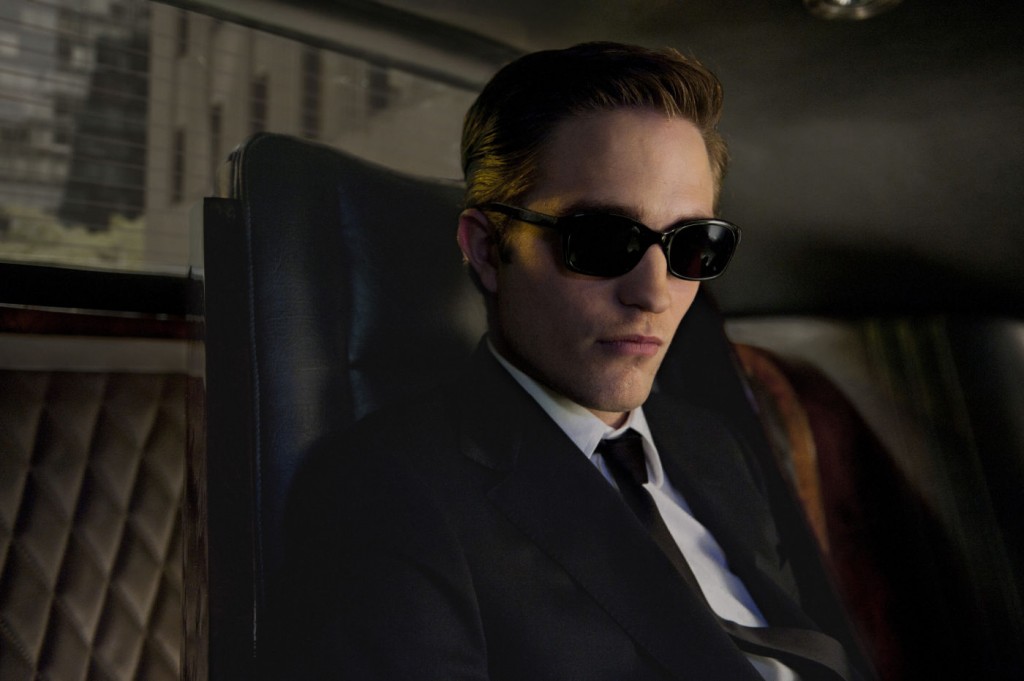Review: Cosmopolis (2012)
Cosmopolis is shockingly unconventional — so much so that I almost don’t blame some people for disliking it. It is slow, stagey, has stilted dialogue, ciphers for characters and a lack of resolution. But it also has great actors, a mesmerizing score and brilliant ideas. It’s almost impossible to predict how some people will react to this film, but for fans of Cronenberg and Don DeLillo (I am both) the film has some definite appeal, despite it being frustratingly detached.
Based on DeLillo’s 2003 novel, Cosmopolis is the story of 28-year-old billionaire assets manager Eric Packer (Robert Pattinson). The novel was meant to be a modern-day Ulysses of sorts, with a series of mad happening all occurring within one day around one central character. The plot is simple: on an April morning Packer decides he wants to get haircut. He gets into his hi-tech limousine and makes for his barber’s across town. However, it’s not quite that simple to get to the barber’s.
Along the way, Packer comes across various individuals and situations. He has sexual liaisons in the limo en route and bumps into his detached new bride (Sarah Gadon) more than once. He has meetings with various business underlings (Jay Baruchel and Philip Nozuka) and chats with his chief of security (Kevin Durand). He comes across an Occupy-like protest and the funeral parade for a dead rap star. As well, a threat is made on Packer’s life, so while Packer moves closer to getting his haircut, he also moves closer to confronting his assassin.
This is a very faithful adaptation. The only changes I really noticed besides a trimming of scenes here and there were the removal of a third scene between Packer and his wife and the swapping in of the Chinese yuan for the Japanese yen. Perhaps the most significant change is that in the novel Packer has brief subjective visions of the future through his technology, as if he is prophetic. Unfortunately, film can’t replicate Packer’s thoughts the same way a novel can, and so it makes sense for these visions to be removed, even if it obscures the ending a bit.
The most impressive aspect of the film is its ideas. While DeLillo’s novel took a lot of flak for its theories when it came out in 2003, his ideas seem prescient in retrospect. The film can be taken as a psychotic satire of the 1% and cybercapital. It may be absurd, but it also highlights how detached and bizarre the lives of the mega-rich are. Similar to American Pyscho’s Patrick Bateman, Eric Packer is hardly identifiable as a human being. For DeLillo and Cronenberg, the rich are disgusting monsters created by their social environment.
Most of these ideas are delivered through stilted dialogue taken word for word from DeLillo. A scene with Samantha Morton as Packer’s Chief of Theory is especially riveting. Cronenberg’s slow camera movements and Howard Shore’s ambient score perfectly underpin Morton’s words as the limo passes through a protest site. Morton and Almaric as a guerilla activist known as the “Pastry Assassin” are particularly good at rendering DeLillo’s cryptic language into hypnotic speech.
Technically, Cosmopolis is an impressive film. It can feel stagey at times due to the limited cuts and sets, but it’s hardly an “un-cinematic” film. Howard Shore’s score pulses through the film and Cronenberg’s assured camera movements and angles make the limousine far from a confined space. I was initially baffled by Cronenberg’s decision to buffer the limousine against all outside sound, but eventually realized that the lack of outside sound turns the limo into a figurative womb for Packer as he travels across the city. It emphasizes just how isolated Packer is from reality.
The acting is another standout. This is Robert Pattinson’s film and he really rises to the occasion. His particular style of intense, tonally flat acting perfectly suits Packer’s dejectedness. The various supporting actors are all quite impressive, though Paul Giamatti as a disgruntled former employee of Packer’s really takes the cake among them.
And yet, despite all this good acting and interesting filmmaking, I am still hesitant to call Cosmopolis a great film. While its ideas are fascinating, it’s tonally jarring at first and takes a while to acclimatize to. As well, its characters are little more than ciphers or metaphors for its ideas. Packer is the only character that is given an arc and allowed to grow. It’s almost more interesting to discuss than to watch, a trap Cronenberg falls into with his most heady movies. It’s very likely that Cosmopolis will improve on repeat viewings, but right now, I am too puzzled by its impenetrability to be overwhelmingly enthusiastic about it.
Cronenberg is a director known for going over the top in the past. It’s curious then that Cosmopolis can be so restrained, despite its potential to be explosive.
Nevertheless, this is a fascinating film, one you will want to analyze and discuss long after the credits roll, and in spite of whether you enjoyed it or not. It’s not Cronenberg at his most daring, but like Crash, it is an underrated gem of ideas. It’s also a prime example of how to utilize Robert Pattinson as an actor. Pattinson is not a bad actor. You just have to give him compelling material to work with.
7 out of 10
Cosmopolis (2012)
Directed by David Cronenberg; written by David Cronenberg based on the novel by Don DeLillo; starring Robert Pattinson, Juliette Binoche, Sarah Gadon, Matthieu Almaric, Jay Baruchel, Kevin Durand, K’Naan, Emily Hampshire, Samantha Morton, Philip Nozuka and Paul Giamatti.
